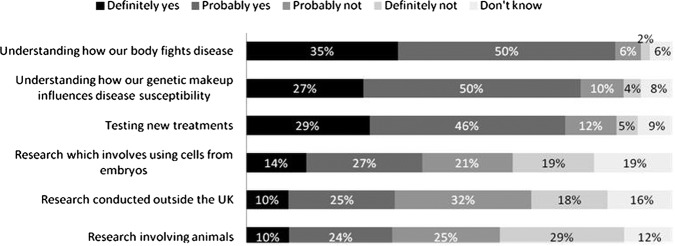Figure 3.

Would you be willing to donate samples for the following type of samples for research?
Note: percentages may not add up to 100% due to rounding. The χ2 test was conducted to examine effects of participants’ characteristics on willingness to donate samples for research outside the UK and research involving animals as these two research types had least support. Those participants who were less willing to donate samples for research outside the UK were significantly more likely to be: over 55 years (67.8% vs 53.8%, χ2=17.2(1); p=0.001), from a low socioeconomic group (E, 72.8% vs 56.6%, χ2=11.92(1); p=0.001), non-white ethnicity (78% vs 58%, χ2=5.7(1); p=0.017), have a religious affiliation (63.4% vs 49.8%, χ2=14.83(1); p=0.001), have a lower education level (GCSE or equivalent or lower, 65.9% vs 55.5%, χ2=8.18(1); p=0.004) and not having had tissue removed during a medical procedure (62.5% vs 55%, χ2=4.57(1); p=0.033). Those participants who were less willingness to donate samples for research involving animals were significantly more likely to be: women (69.5% vs 51.8%, χ2=30.74(1); p<0.001), from a low socioeconomic group (E, 78% vs 58.4%, χ2=19.9(1); p<0.001), non-white ethnicity (80% vs 60.5%, χ2=6.09(1); p=0.014), have a religious affiliation (63.6% vs 56.7%, χ2=4.02(1); p=0.045), be very religious whereby they did have a religious affiliation (78.7% vs 61.9%, χ2=5.99(1); p=0.014), have no knowledge of the medical research process (67.6% vs 57.1%, χ2=10.4(1); p=0.001) and not having agreed to donate left over tissue for medical research (81% vs 49.3%, χ2=6.12(1); p=0.013).
